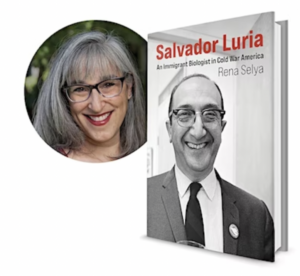Events
Rena Selya’s SALVADOR LURIA w/Deborah Douglas, Richard Hynes, & Phillip Sharp

Join us to discuss Rena Selya’s biography of Salvador Luria with Deborah Douglas, Richard Hynes & Phillip Sharp.
Presented by the MIT Press Bookstore and the Koch Institute at MIT.
Blacklisted from federal funding review panels but awarded a Nobel Prize for his research on bacteriophage, biologist Salvador Luria (1912–1991) was as much an activist as a scientist. In Salvador Luria: An Immigrant Biologist in Cold War America, Rena Selya draws on extensive archival research; interviews with Luria’s family, colleagues, and students; and FBI documents obtained through the Freedom of Information Act to create a compelling portrait of a man committed to both science and society.
Luria was born in Italy, where the Fascists came to power when he was ten. He left Italy for France due to the antisemetic Laws of 1938, and then fled as a Jewish refugee from Nazi Europe, making his way to the United States. Once an American citizen, Luria became a grassroots activist on behalf of civil rights, labor representation, nuclear disarmament, and American military disengagement from the Vietnam and Gulf Wars. Luria joined the MIT faculty in 1960 and was the founding director of the Center for Cancer Research. Throughout his life he remained as passionate about his engagement with political issues as about his science, and continued to fight for peace and freedom until his death.
Rena Selya is an historian and archivist of science. Her work focuses on the history of twentieth century biology and medicine, with a particular interest in the role of scientists in American culture. She has taught at Harvard University, UCLA, and Santa Monica College. Dr. Selya is the Archivist and Associate Director of the Program in the History of Medicine at Cedars-Sinai Medical Center. Salvador Luria is her first book.
Selya will be in conversation with Richard Hynes and Phillip Sharp. Richard Hynes is the Daniel K. Ludwig Professor for Cancer Research at MIT. He received his bachelor’s degree in biochemistry from the University of Cambridge, and his doctorate in biology from MIT. After postdoctoral work at the Imperial Cancer Research Fund in London, he returned to MIT—recruited by Professor Luria—as a founding faculty member of the MIT Center for Cancer Research. He later headed MIT’s Biology Department, and served as Director of the MIT Cancer Center, now the Koch Institute.
Phillip A. Sharp, an Institute Professor at MIT, is a member of the Department of Biology and the Koch Institute for Integrative Cancer Research. He was recruited to the Center for Cancer Research in 1974 as a founding faculty member, serving as director from 1985 to 1991 before becoming head of the Department of Biology for eight years. He was founding director of the McGovern Institute from 2000 to 2004. Professor Sharp received the 1993 Nobel Prize in physiology or medicine for his discovery of “split genes.”
Deborah Douglas will moderate the conversation. Douglas is the director of collections and curator of science and technology at the MIT Museum as well as research associate with the MIT Program of Science, Technology, and Society. A specialist in the history of technology and science, Dr. Douglas has also held positions at the Smithsonian’s National Air and Space Museum, NASA Langley Research Center, Chemical Heritage Foundation and taught at Old Dominion University and MIT. A graduate of Wellesley College (AB) and the University of Pennsylvania (AM, PhD).
-
Hosted By
-
Date
October 26, 2022 5:30 pm – 7:00 pm
-
Location
Koch Institute for Integrative Cancer Research Massachusetts Institute of Technology
500 Main Street, Building 76, Cambridge, MA, 02139-4307, 1 -
Cost
$Free